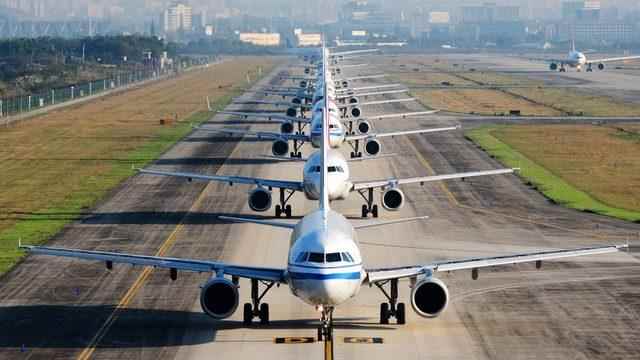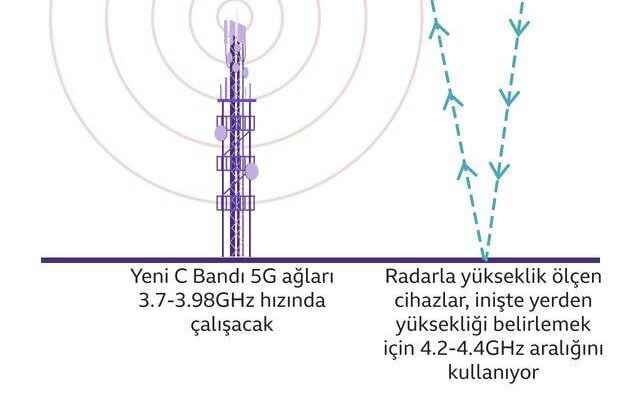American cell phone companies AT&T and Verizon have once again agreed to delay 5G service, which they plan to expand to include some airports.
The commissioning of the 5G service, which is expected to be used in more places as of today, has been delayed twice before.
The decision to delay comes after airlines voiced their concerns about 5G technology.
Top 10 US airlines warn that the immediate switch to 5G technology could be disastrous.
Airline officials say the new technology could delay thousands of flights and prevent the majority of American planes from taking off.
What is 5G and how does it affect aviation in the USA?
5G, which can be described as a new generation wireless internet connection, speeds up downloading and uploading data from phones and allows more devices to connect to the internet at the same time.
5G uses radio signals for this. The radio frequencies used for 5G in the US are part of the wave range known as the C Band.
The C-Band is close to the frequencies used by devices found in aircraft that measure aircraft ground clearance, while also collecting data for security and navigation systems.
There are concerns that interference from the use of 5G will affect the operation of these devices and cause problems, especially during landing.
How serious is the threat to aircraft?
Probably very serious.
The American company RTCA, which provides guidance on technical issues related to aviation, published a report on the subject towards the end of 2020.
The report stated that the transition to 5G could greatly affect aviation operations in the US and lead to catastrophic failures that could result in fatalities if action is not taken.
The US Aviation Regulatory Agency (FAA) has also recently reported that 5G frequency waves can affect systems on Boeing 787 Dreamliner aircraft.
The FAA pointed out that because of this, planes that have a hard time slowing down for landing may exit the runway.
How will flight safety be ensured?
Aircraft will not be allowed to use radio frequency altitude measuring devices in situations where there is a serious risk of interference.
However, this will limit the landing capability of some aircraft, for example in situations where visibility is not clear.
Airlines for America, which represents 10 airlines, reported that this could cause more than a thousand flights to be delayed or canceled due to bad weather, sometimes causing the vast majority of passenger and transport aircraft to be “grounded”.
According to Airlines for America, a large portion of the American aircraft fleet will become unusable due to restrictions placed on their operations.

Do other countries using 5G also share these concerns?
Not to the same extent. This is because the transition to 5G technology is different in each country.
For example, networks in European Union member countries operate at lower frequencies than those planned for use in the USA, reducing the risk of interference.
Still, some countries took action to reduce the risks.
In France, there are “buffer zones” around airports where 5G signals are restricted. Antennas also need to be tilted downwards to avoid interference.
What other measures are being taken in the USA?
Aviation authorities in the US have already taken some precautions.
The FAA has temporarily restricted the activities of 5G service providers in areas around 50 airports. However, these are much smaller areas than in France, and transmitters in the USA are also much more powerful.
The FAA is also trying to determine which altitude measuring devices will be safe and which should be replaced in areas with 5G networks.
Airports were also identified where global positioning systems, known as GPS for short, could be used instead of radio frequencies to assist planes preparing for landing.
However, airlines find the measures insufficient and argue that 5G networks should not be used at all within 2 miles of affected airports.
What do telecom companies say?
Verizon and AT&T companies have agreed to temporarily delay the transition to 5G once again.
AT&T announced that the two companies have agreed to temporarily delay the transition to 5G in “a limited number of towers around certain airport runways.”
Some 5G towers will not be operational while talks continue to find a permanent solution.
This is thought to reduce the likelihood of systems on board the aircraft being affected.
US President Joe Biden has announced that the delay only affects 10 percent of towers in the expanded coverage of 5G.
Phone companies, which have delayed the transition to 5G twice before, have agreed to create temporary buffer zones around airports.

The two companies expressed their frustration over the recent delay. AT&T reported that they have been struggling for two years to launch its 5G service.
Phone companies also pointed out that 5G is being used in about 40 countries.
US wireless service company CTIA accused airlines of “fear-mongering” last month and warned that delaying the transition to 5G would hurt the economy.
What’s the situation in England?
In the UK, regulators don’t seem too worried.
“There have been no confirmed cases of interference from 5G causing malfunctions or unexpected disruptions to aircraft systems,” the British Civil Aviation Authority (CAA) said in a security note released in December.
British officials stressed that some countries are more vulnerable due to different national telecommunication strategies. Officials say they will work with international institutions to collect more data.
